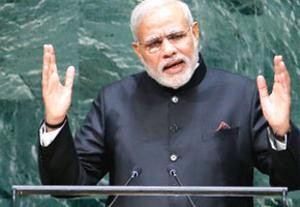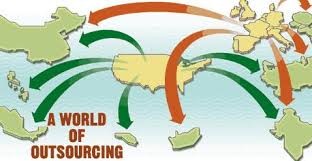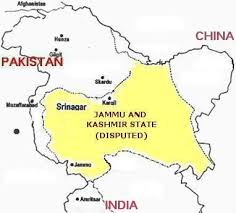World is interdependent
 In his maiden speech on 27th September 2014, at 69th United Nations General Assembly (UNGA) India’s new Prime Minister Narendra Modi advocated unity among various nations in the world; he advocated “G-All” grouping (group of all nations in the world), rather than participating in smaller fractional groups like the “G 8”. Mr. Modi solicited the gatherings that in spite of existence of a body like United Nations why nations are operating in various Gs with different numbers? Every Government will have to discharge their responsibilities for development of the world, which calls for better coordination of policies and understandings. Mr.Modi spoke astutely in the gathering and was applauded by the audience. The gathering went euphoric after his speech.
In his maiden speech on 27th September 2014, at 69th United Nations General Assembly (UNGA) India’s new Prime Minister Narendra Modi advocated unity among various nations in the world; he advocated “G-All” grouping (group of all nations in the world), rather than participating in smaller fractional groups like the “G 8”. Mr. Modi solicited the gatherings that in spite of existence of a body like United Nations why nations are operating in various Gs with different numbers? Every Government will have to discharge their responsibilities for development of the world, which calls for better coordination of policies and understandings. Mr.Modi spoke astutely in the gathering and was applauded by the audience. The gathering went euphoric after his speech.
Talking about the fact that the UN is completing 70 years in 2015, the Indian Prime Minister Mr. Modi said, “We need to think how to create a G-all atmosphere when the UN is about to celebrate its 70 years next year.”
 Though in the past, nations could afford to exist in isolation, today it is simply impossible for any nation to do so. The world has changed; the nations are interdependent on each other. The earlier we realize this fact the better. Each nation should realize that it is sharing the planet with others. As nations are progressing in research and development in science and technology, societies are getting unified. Another fact is no nation in the world can exist without bilateral trade; therefore, whatever happens in a nation eventually affects many others. Within the context of our interdependence, isn’t it high time that our self-interest clearly lies in considering the interest of others?
Though in the past, nations could afford to exist in isolation, today it is simply impossible for any nation to do so. The world has changed; the nations are interdependent on each other. The earlier we realize this fact the better. Each nation should realize that it is sharing the planet with others. As nations are progressing in research and development in science and technology, societies are getting unified. Another fact is no nation in the world can exist without bilateral trade; therefore, whatever happens in a nation eventually affects many others. Within the context of our interdependence, isn’t it high time that our self-interest clearly lies in considering the interest of others?
The world is getting highly complex because of the brewing politics between the mightier and smaller – less developed nations. No single nation can call the shorts. At least for the sake of international trade, nations have to consider each other’s concerns and interests. Mr. Modi offered crisp comments on ethical base of sovereignty of nations. He said there are many pragmatic issues beyond profit and loss. “Let us pledge that 2015 will mark the year when we steer the world in a new direction. Let us work towards a sustainable world,” Mr. Modi said. He solicited a promise to reform UN Security Council by 2015.
The need of the hour is to counter terrorism which is emerging in new forms and names every day. No nation is free of terrorism. And, there are some nations that are giving protection to the terrorists. State terrorism, Bioterrorism, Cyber terrorism, Eco Terrorism, Nuclear Terrorism and Narco Terrorism are challenging law makers, law enforcing authorities and political systems to distinguish different types of terrorism as part of the larger effort to understand how to counter and dissuade it. All countries need to unite to fight terrorism. The shadow of terrorism must end. A comprehensive Convention on International Terrorism is urgently required.
 On the issue of Kashmir, when Pakistan Prime Minister Nawaz Sharif spoke at length, Mr. Modi crisply made it clear to the world that the neighboring country of India needs to create an atmosphere for peaceful talks without the shadow of terrorism. Pakistan must accept its responsibility of creating conducive atmosphere for the serious discussion. From the first day, NDA government has worked towards promoting friendship and cooperation with its neighbors, and it is keen on resolving Kasmir problem.
On the issue of Kashmir, when Pakistan Prime Minister Nawaz Sharif spoke at length, Mr. Modi crisply made it clear to the world that the neighboring country of India needs to create an atmosphere for peaceful talks without the shadow of terrorism. Pakistan must accept its responsibility of creating conducive atmosphere for the serious discussion. From the first day, NDA government has worked towards promoting friendship and cooperation with its neighbors, and it is keen on resolving Kasmir problem.
Every nation has its own culture and tradition in its foundation of civilization. Mr. Modi said India sees the entire world as a family; it cares for the prosperity of the world. Indian culture believes in brotherhood. Mr. Modi has paved way for world bodies like UN to ponder on restructuring sovereign rights and responsibilities of nations in an interdependent world; a serious thought needs to comprehend on how certain rights stand in the way of achieving important international objectives.
Fragile elements and cyclical alterations are tightly linked to the interdependence of world. I conclude my review of Mr. Modi’s brilliant speech at UNGA on the point of interdependence of world by giving three examples. In 1986, a chemical fire and spill in Basel, Switzerland poisoned 185 miles of the Rhine River; this incident damaged ten years of ecological recuperative work because it threatened public water supplies. The long-term consequences are a matter of debate even today.
 In 2007 the subprime crisis in United States led global financial markets to topple since in August 2007; the sensex in almost all major countries fell down with a hefty loss. The American Stock Exchange lost 645 points at 14,936. The NSE Nifty ended at 4,346, down 183 points. Elsewhere in Asia, Hong Kong’s Hang Seng Index slumped 730 points to 22,455. Japan’s Nikkei plunged 378 points to 16,871. Taiwan’s Taiwan Weighted index crashed 395 points to 8892, and China’s Shanghai Composite index shed 170 points at 4,301. The world economy even today is suffering from this global financial and economic crisis that has become severe since the second half of 2008. Europe was the next affected, thereafter its effect spread to the rest of the world. East Asia did not escape. The depth and speed of the worst crisis is worldwide through the financial sector and trade linkages, and its severity has affected the recession particularly in emerging market economics, small countries, and East Asia.
In 2007 the subprime crisis in United States led global financial markets to topple since in August 2007; the sensex in almost all major countries fell down with a hefty loss. The American Stock Exchange lost 645 points at 14,936. The NSE Nifty ended at 4,346, down 183 points. Elsewhere in Asia, Hong Kong’s Hang Seng Index slumped 730 points to 22,455. Japan’s Nikkei plunged 378 points to 16,871. Taiwan’s Taiwan Weighted index crashed 395 points to 8892, and China’s Shanghai Composite index shed 170 points at 4,301. The world economy even today is suffering from this global financial and economic crisis that has become severe since the second half of 2008. Europe was the next affected, thereafter its effect spread to the rest of the world. East Asia did not escape. The depth and speed of the worst crisis is worldwide through the financial sector and trade linkages, and its severity has affected the recession particularly in emerging market economics, small countries, and East Asia.
In another episode, a nuclear reactor explosion at Chernobyl produced measurable increases in radiation in far distant places. In the immediate expanse of the reactor, agricultural fields were contaminated. In a number of European countries, crops were contaminated and preventive measures were initiated. The long-term consequences of this case are also a matter of debate and speculation. But the veracity of the convergence and interdependence of world economy can no longer be ignored.
The proverb “United we stand, divided we fall” is so true!!












































